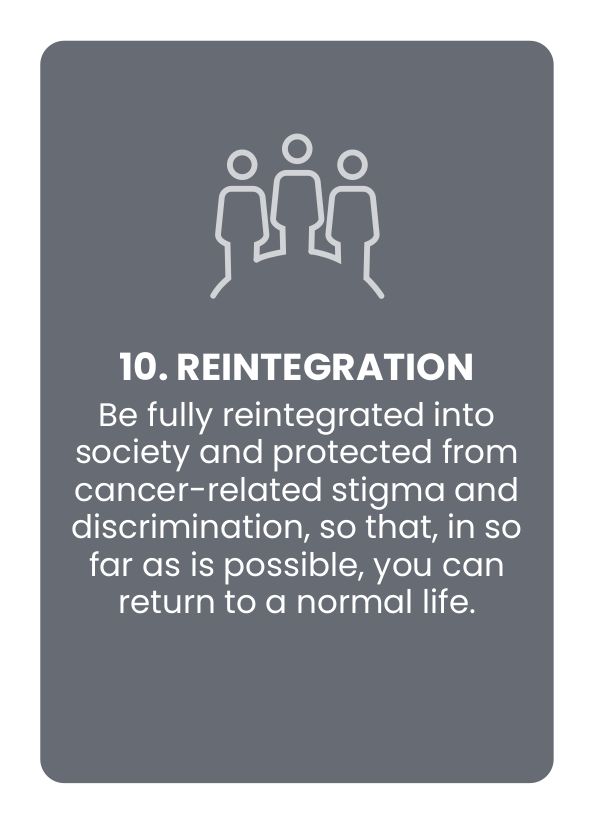European Code of Cancer Practice
The European Code of Cancer Practice (The Code), translated in many languages, is a citizen and patient-centred manifesto of the core requirements for good clinical cancer practice, in order to improve outcomes for all of Europe’s cancer patients.
It has been co-produced by a team of cancer patients, patient advocates and cancer professionals. It has its origins in the European Cancer Patient Bill of Rights, which was launched in the European Parliament on World Cancer Day 2014 and won the prestigious 2018 European Health Award.
The Code focusses on informing and assisting cancer patients at all stages of their cancer journey. It sets out a series of 10 key overarching rights, and in particular signposts what patients should expect from their health system, in order for them to achieve the best possible outcomes. It is an empowerment tool to ensure the best available care is delivered for European citizens and patients. Each of the 10 overarching rights is linked to three questions that a patient/parent/guardian may choose to ask their healthcare professionals.
Read more here.
You have a right to:
Equal access to affordable and optimal cancer care, including the right to a second opinion.
Three key questions that every cancer patient may choose to ask:
- Will my care be the best available and comparable to other high quality cancer care and good clinical cancer practice in my country and elsewhere in Europe?
- Are patient outcomes in our cancer care service as good in general as in other centres in my country and elsewhere in Europe?
- Do I have the right to ask for a second opinion if I so wish?
Explanation
European cancer patients should receive affordable, best available cancer care in their own country which is comparable to other high quality cancer services in Europe. The cornerstone of The Code is the right of Europe’s cancer patients to have equal access to such cancer care, with the choice where to be treated and by whom, Each cancer patient, with their family/carer, should have the opportunity to discuss with their healthcare professionals whether the care that they will receive is the best available within their healthcare system and whether it is of the standard of good clinical cancer practice required by clinical guidelines.
Read more here.
Read the Supporting Literature and Evidence here.
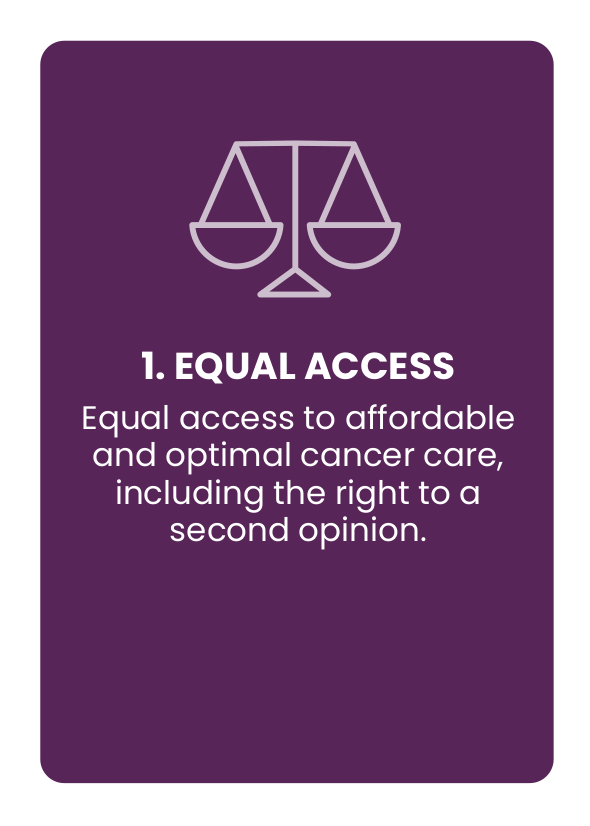
You have a right to:
Information about your disease and treatment from your medical team and other reliable sources, including patient and professional organisations.
Three key questions that every cancer patient may choose to ask:
- Will I be able to decide how much information I should receive about my diagnosis, treatment (including the benefits and risks) and the management of my disease?
- May I bring a relative or friend to my consultations?
- Will I receive written information about my cancer and will I be given contact details for relevant patient organisations?
Explanation
European cancer patients are entitled to reliable, good quality, comprehensive information from their hospital about their disease, its treatment and the consequences of that treatment. Patients should be informed that they can ask questions about their disease and its treatment, as well as receiving information on nutrition, physical activity, psychological aspects, etc. The hospital should also refer the patient to patient organisations which can provide invaluable information and support at many levels. Information given at a consultation should be supported with good quality, relevant and clearly-written material, with appropriate explanations for the individual patient.
Read more here.
Read the Supporting Literature and Evidence here..
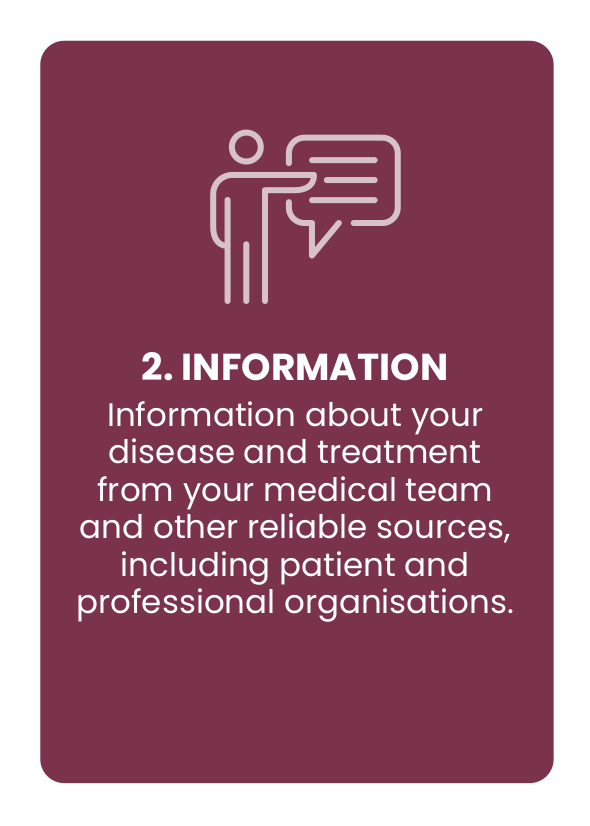
You have a right to:
Information about the quality and safety of care, the level of expertise and the outcomes achieved for your type of cancer in the centre where you are being treated.
Three key questions that every cancer patient may choose to ask:
- Will my diagnosis and treatment be managed by a team of healthcare professionals with the necessary expertise to give the best advice and identify the best available options for me?
- Is that team specialised in the particular cancer with which I have been diagnosed?
- Does my healthcare team keep records of their clinical outcomes which I may see in an anonymised format, and will I be able to compare those outcomes to those achieved by similar teams in similar institutions?
Explanation
European cancer patients should be given access to information about the care provided and the outcomes achieved by their specific cancer healthcare team, allowing patients to take informed decisions about their treatment and where it is delivered. Specialised cancer care should be given by a team of healthcare professionals with expertise in a specific cancer and its treatment. Patients have the right to know the level of expertise and experience of healthcare professionals and teams who will be looking after them. Application of the European Cancer Organisation’s Essential Requirements for Quality Cancer Care can help support the delivery of best available care.
Read more here.
Read the Supporting Literature and Evidence here.
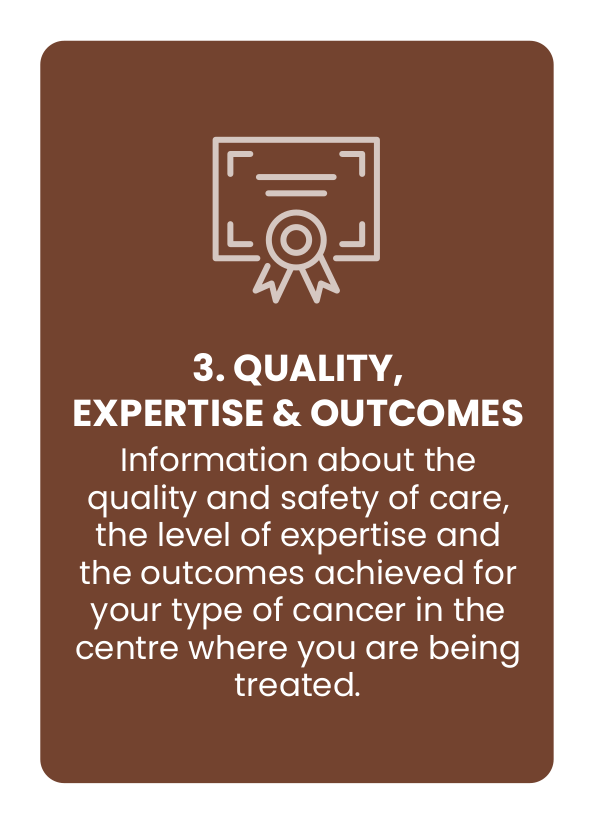
You have a right to:
Receive care from a specialised multidisciplinary team, ideally as part of a cancer care network.
Three key questions that every cancer patient may choose to ask:
- Is my care discussed by a multidisciplinary team?
- Are my views and preferences clearly communicated to this team in a timely fashion?
- Is our cancer service part of a cancer network?
Explanation
European cancer patients’ care should be organised so that the best decisions about choices of treatment are made, ensuring best available care is delivered in the most effective and timely way, as close to the patient’s home as is safely possible. The two organisational structures recommended are the specialised multidisciplinary team (MDT) and the cancer network. These bring together all of the different healthcare professionals, whose combined knowledge ensures that the best treatment options are discussed with the patient and that Shared Decision-Making (SDM) takes place, thus ensuring a well-informed choice is made about the patient’s individual treatment and care.
Read more here.
Read the Supporting Literature and Evidence here.
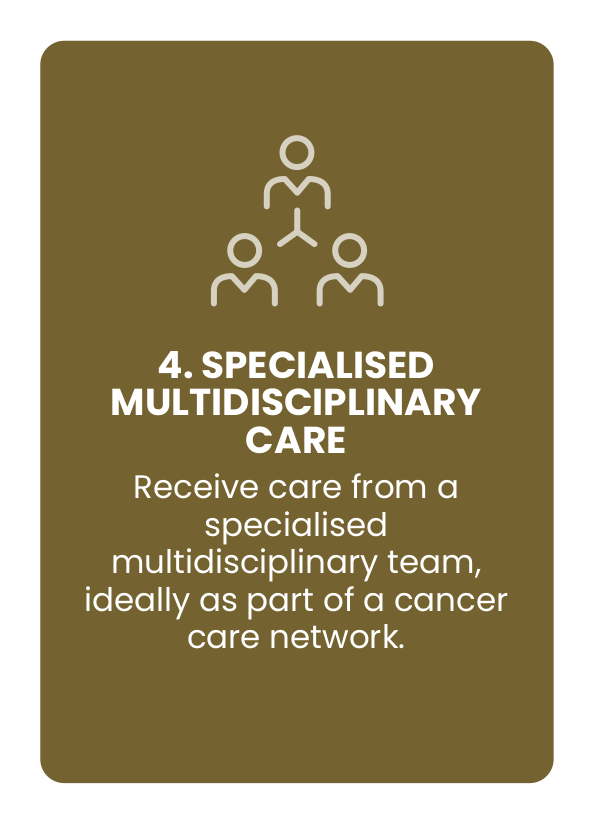
You have a right to:
Participate in Shared Decision-Making with your healthcare team about all aspects of your treatment and care.
Three key questions that every cancer patient may choose to ask:
- May I discuss the approach that we will take in making decisions about my care and agree how my voice is heard?
- May we share decision-making so I feel empowered to decide on my care options?
- Does our cancer service encourage patient engagement, involvement and empowerment?
Explanation
European cancer patients should have a choice as to how decisions are taken about their care. That choice should include Shared Decision-Making (SDM). Increasingly, a shared or collaborative approach is being employed, in which a doctor recommends a particular treatment, but takes account of the patient’s situation and views after careful discussion. SDM allows patients to fully inform themselves before making any choices about their treatment. It is a key component of patient involvement and engagemen in cancer caret, with healthcare professionals encouraging patients to influence how their own care and healthcare services are delivered.
Read more here.
Read the Supporting Literature and Evidence here.
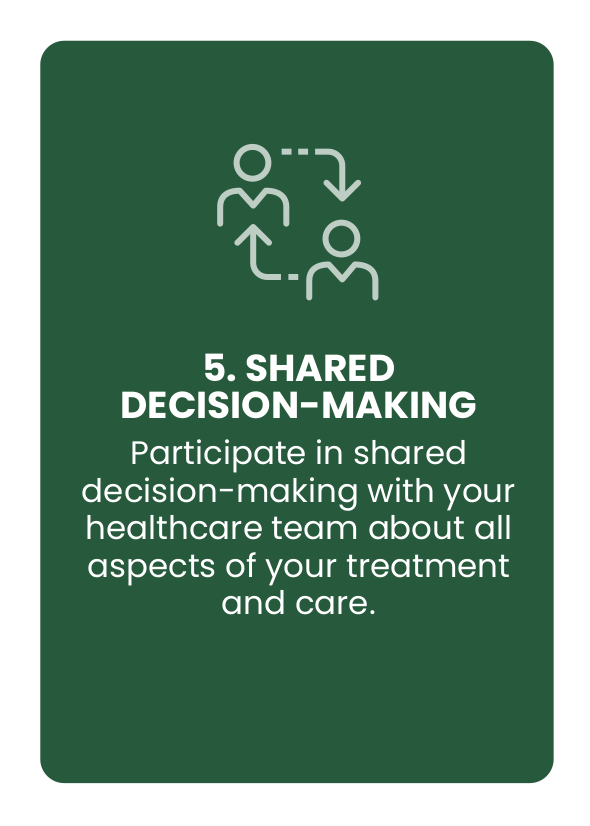
You have a right to:
Be informed about ongoing research relevant to you, and your ability and eligibility to participate in research.
Three key questions that every cancer patient may choose to ask:
- Is our cancer service active in performing cancer research, enrolling patients in clinical trials and supporting innovation?
- Is there a study or clinical trial in which I could participate if I am eligible and if I choose to do so?
- May I go to another hospital or centre if I wish to be involved in a specific clinical research project not offered at my hospital or centre?
Explanation
European cancer patients should be informed about any ongoing research and innovation (including clinical trials) within the cancer service delivering their care. Clinical cancer research provides the evidence which ensures patients receive the best available care, enhancing healthcare delivery, leading to better outcomes and improved quality-of-life for patients. Evidence indicates that research-active hospitals provide better care, achieve higher levels of patient satisfaction and deliver improved survival for patients compared to hospitals not active in research. Patients must be assured by the clinical team that a decision to not participate in clinical research or to withdraw from a research study, will not adversely affect their care.
Read more here.
Read the Supporting Literature and Evidence here.
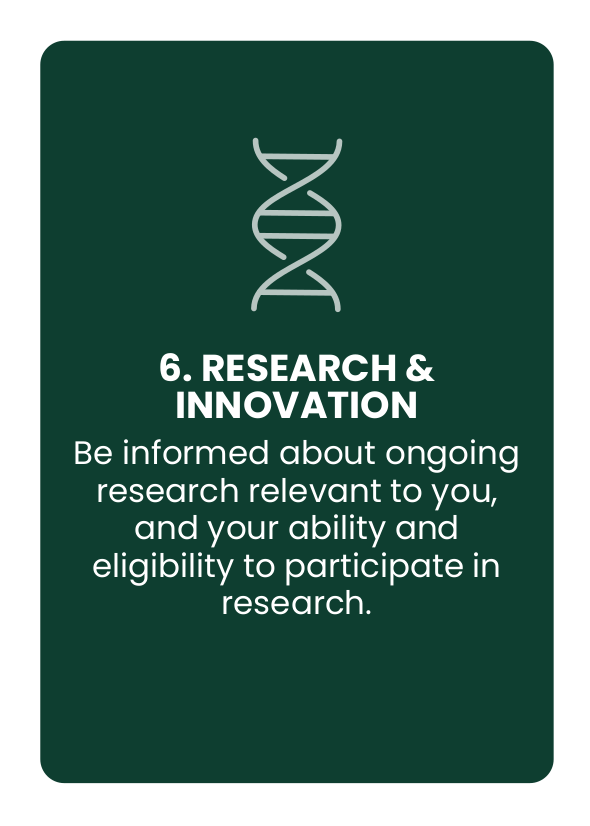
You have a right to:
Discuss with your healthcare team your priorities and preferences to achieve the best possible quality-of-life.
Three key questions that every cancer patient may choose to ask:
- During and after my treatment, how will I be able to maintain the optimum quality-of-life so that I can live as normally as possible?
- Does our cancer service measure the quality-of-life of patients in any way, such as using Patient Reported Outcome Measures (PROMs)?
- Does our cancer service actively consider whether people have emotional, social or financial problems pertaining to their diagnosis or treatment?
Explanation
European cancer patients should expect to live as normally as possible with the optimum quality-of-life following their diagnosis, during treatment and through survivorship. Patients must be thoroughly informed on both medical and non-medical aspects of care and survivorship. Patients and their healthcare professionals must work together to preserve quality-of-life, while maximising chances of survival or cure. Referring patients to patient advocacy groups will provide additional support, particularly on the issues that patients specifically find challenging. Healthcare services should provide psychological support, to support the person’s mental wellbeing and mobilize advice and support to reduce social and financial difficulties.
Read more here.
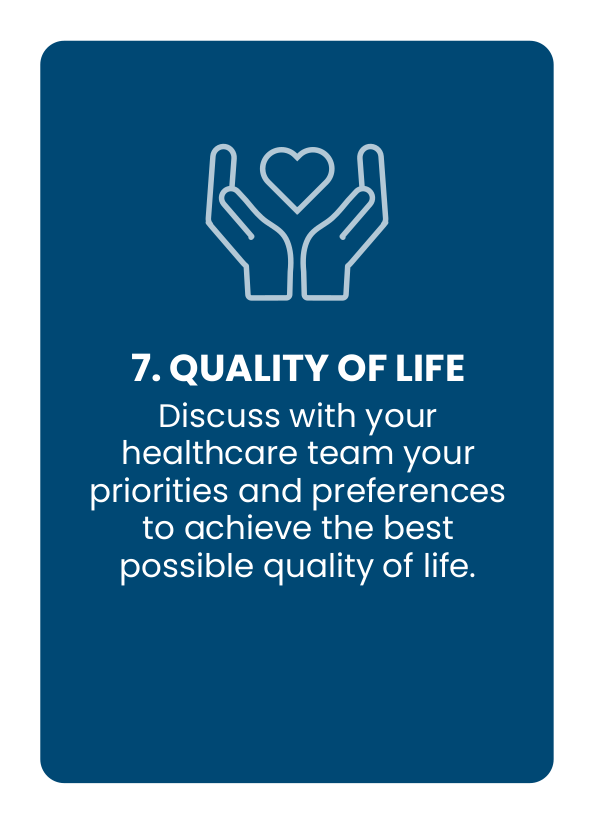
You have a right to:
Receive optimal supportive and palliative care, as relevant, during any part of your cancer journey.
Three key questions that every cancer patient may choose to ask:
- Will I be given supportive and palliative care on my cancer journey, based on my individual needs?
- Can I ask to be referred to the supportive and palliative care service at any time?
- Is the supportive and palliative care service provided at home and in hospital?
Explanation
European cancer patients should have access to supportive and palliative care at any point of their cancer journey, from diagnosis, as survivors or in end-of-life care. As a patient, you have the right not to receive specific anti-cancer treatment such as surgery, radiotherapy or chemotherapy, but to choose supportive and palliative care to alleviate your symptoms. You have the right to make your own end-of-life decisions and for your choices to be respected within the current laws of the country within which you are receiving your care. Close working between cancer care and palliative care teams is a feature of good clinical cancer practice.
Read more here.
Read the Supporting Literature and Evidence here.
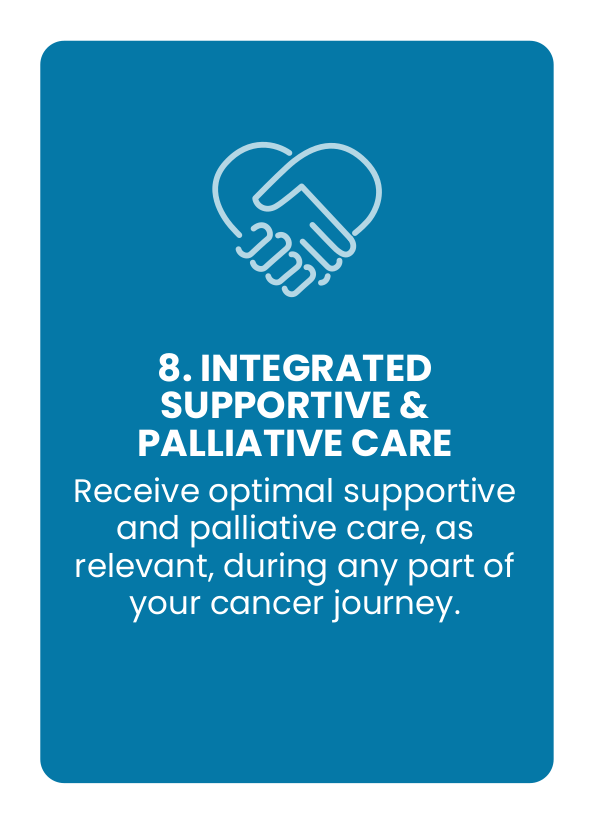
You have a right to:
Receive and discuss with your care team a clear, managed and achievable plan for your survivorship and rehabilitation.
Three key questions that every cancer patient may choose to ask:
- Will our cancer service help me face my challenges as a cancer survivor?
- Will I be given a survivorship care plan to help me cope with any problems I may encounter as a cancer survivor?
- How do I access supportive and rehabilitation help for cancer survivors?
Explanation
European cancer patients’ care should be supported in their needs as a cancer survivor. In response to the growing number of people surviving cancer in Europe, there has been increasing focus on the quality of survival. High-quality cancer care should include an active approach to the challenges that patients face as cancer survivors. Every patient should be given a survivorship cancer plan, prepared for them in consultation with their cancer care professionals and fully explained. Patient advocacy organisations have a lot of experience in the practical issues that arise (e.g. relating to work, travel, leisure activities etc) and should be consulted.
Read more here.
Read the Supporting Literature and Evidence here.
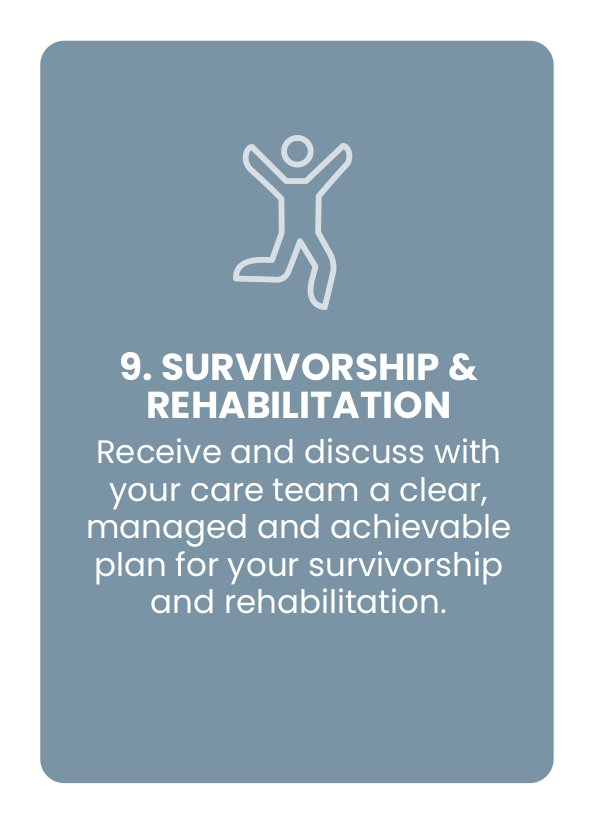
You have a right to:
Be fully reintegrated into society and protected from cancer-related stigma and discrimination, so that, in so far as is possible, you can return to work and a normal life.
Three key questions that every cancer patient may choose to ask:
- Should I anticipate any difficulties in fully reintegrating into society, including within my family and in social and work environments?
- If I do experience problems in any of these areas, to whom can I turn for help and advice?
- Where can I obtain advice on the legal issues that may relate to my employment, financial issues such as insurance and family issues such as international travel and holidays?
Explanation
European cancer patients should be able to reintegrate into society to the fullest extent possible. However, increasingly cancer survivors are facing challenges as they reintegrate into society. Survivors should be able to obtain appropriate support and advice to help them with the process of reintegration, to sustain their quality-of-life, to ensure their ability to earn a living and to have an active and fulfilling social life and contribute to society. Cancer patients should also have the Right to be Forgotten, so that a previous diagnosis does not stigmatise cancer survivors on their journey to return to normal living.
Read more here.
Read the Supporting Literature and Evidence here.
